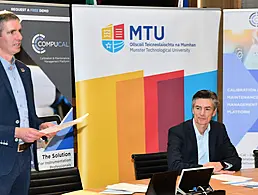Speaking at the latest Harvey Nash DiversiTech meet-up, Jackie Glynn, head of portfolio management at Three Ireland, focused on the need for continual personal development, the growing importance of leadership and behavioural skills, and the measures that the Irish chapter of the Project Management Institute are taking to better equip tomorrow’s leaders.
For many people, the concept of industrial revolutions is confined to secondary-school books and tends not to look beyond the steam and British railway system in the 18th century. However, with the advent of great technological advances, there have been more since. Indeed, according to Klaus Schwab, founder and executive chairman of the World Economic Forum, we are bang in the middle of the fourth industrial revolution.
The first industrial revolution involved steam and water-powered mechanical production equipment. The second was the result of division of labour, electricity and mass production. The third came through electronics, IT and automated production. Now, the fourth industrial revolution will come from supercomputing, intelligent robots and the internet of things (IoT).
The speed of current breakthroughs has no historical precedent. When compared with previous industrial revolutions, the fourth is evolving at an exponential rather than a linear pace, with emerging technology breakthroughs in fields such as artificial intelligence, robotics, the IoT, autonomous vehicles, 3D printing, nanotechnology, biotechnology, materials science, energy storage and quantum computing.
Coupled with these advancements is the connection of billions of people to mobile devices with unprecedented processing power, storage capacity and access to knowledge.
Moreover, this is disrupting almost every industry in every country. The breadth and depth of these changes heralds the transformation of entire systems of production, management and governance.
‘The breadth and depth of these changes heralds the transformation of entire systems of production, management, and governance’
Given the scale of transformation and disruption of industries with emerging technologies, it is clear that the degree of change required for the fourth industrial revolution can only be implemented by delivery of successful programmes and projects.
This means that project managers, in addition to having technical skills and being competent in a project management methodology, also need to focus on their leadership and behavioural skills.
This need is well supported by leading bodies within the project management profession. Indeed, the Project Management Institute (PMI) requires project managers to have continual professional development, stating that the ideal skill set – the ‘talent triangle’ – is a combination of technical, leadership, and strategic and business management expertise. Similarly, the International Project Management Association, when referring to ‘the eye of competence’, focuses heavily on behavioural, contextual and technical competencies.
In a business context, more and more companies are seeking added skills in leadership and business management – competencies that can support longer-range strategic objectives that contribute to the bottom line.
It may surprise you to find that, according to research at Harvard University, the 21st-century workplace – where people move between different roles and projects – closely resembles pre-school classrooms where we learn social skills, such as empathy and cooperation.
‘If we are to influence skills and prepare people for jobs in the 21st century, it is essential that we invest in and start cultivating these skills within the school system’
In my opinion, if we are to influence skills and prepare people for jobs in the 21st century, it is essential that we invest in and start cultivating these skills within the school system at second level. The new curriculum for Junior Cert focuses on active learning, creativity and innovation, and embedding of these key skills.
The Ireland chapter of PMI is playing a key role in encouraging the conversation in relation to these skills by spearheading the following initiatives, which are being led by myself and a core team of committed volunteers.
The Irish PMI chapter has successfully rolled out project management training as an eight-week transition year course in a number of secondary schools in Dublin. The schools have used this training to focus the students on collaborating on projects such as Darkness Into Light, goal runs and fundraising activities, whilst teaching the basics of working in teams and project management knowledge. Our objective is to put this onto the educational agenda to encourage this module as a foundation element of all transition year programmes in secondary schools.
An investment of €36,000 in project management skills development for BT Young Scientist and Technology Exhibition entrants involved free project management training for up to 90 teachers. This training is being provided by practising project managers from the Ireland chapter of PMI on a volunteer basis. Entrepreneurship and project management go hand-in-hand – a great idea cannot become a reality without clear project management. This partnership with the BTYSTE is helping to address this gap in training and ensuring that our brightest students are better positioned to make their brilliant ideas a viable business.
In conclusion, as a long-serving project management practitioner with a leadership role in the Ireland chapter of the Project Management Institute, in the same way that the CoderDojo movement believes that everyone should know how to code, I believe that everyone should have skills in project management. No matter what your profession, you are either going to be part of a project team or lead a project in the 21st century, in this era of the fourth industrial revolution.
By Jackie Glynn
Jackie Glynn is head of the portfolio management office at Three Ireland and has more than two decades’ experience in delivering ICT and business projects. A faculty member and lecturer at the Institute of Project Management (PMI) Ireland, she also serves as PMI Educational Foundation liaison officer.
Looking for jobs in tech or science? Check out our Employer Profiles for information on companies hiring right now and sign up for our Career Republic e-zine for a weekly digest of sci-tech careers news and advice.




